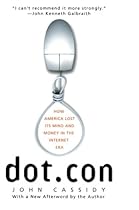Dot.con: How America Lost Its Mind and Money in the Internet Era

| Author | : | |
| Rating | : | 4.76 (687 Votes) |
| Asin | : | 0060008814 |
| Format Type | : | paperback |
| Number of Pages | : | 416 Pages |
| Publish Date | : | 2013-09-15 |
| Language | : | English |
DESCRIPTION:
The Parallels Between the Dot.Com Crash and the Subprime Mess Is Startling I read "Dot.con" after reading an excerpt of it in Michael Lewis' "Panic". I was excited to get a comprehensive account of the internet stock speculative bubble and relate it to the current subprime housing mess. While I can't speak for some of the technical points that other reviewers have pointed out to be erroneous, it was interesting to read this account nearly 7 years after it was published.John Cassidy points out numerous times throughout the book that the speculation of these internet stocks was perpetuated by Wall Street. Virtually every internet IPO was . 4.5 stars-Speculative bubbles always collapse Michael Emmett Brady This is an interesting look at the Dot.Com Nasdaq bubble ,which started in the early 1990's and collapsed in 2000- 2001.This is not surprising since every bubble in history has collapsed. The author pinpoints three groups and/or individuals that he feels are specifically to blame for allowing this fiasco to occur.The first group is the financial journalists and analysts,such as Mary Meeker ,Blodgett,and Abby Joseph Cohen,who used their positions to hype the sale of Dot.com stocks that they knew were purely speculative in nature.The second is a group of one,Alan G. "Easy, informative book" according to Giuseppe A. Paleologo. Dot.con is a book that reads like a long "New Yorker" article. I view this as a quality, given the subject matter. Despite the size of the ".com" bubble, its explanation is not as elusive as other speculative frenzies (e.g., 1929). The recent speculation is the outcome of "herd behavior" on a massive scale, favored by unique historical conditions, such as the development of a new technology, the liquidity excess in the american markets, and a favorable economic environment. There are plenty of quantitative models and historical studies of such behavior. Cassidy s
It was also about an America that believed it had discovered the secret of eternal prosperity: it said something about all of us, and what we thought about ourselves, as the twenty-first century dawned. Moving from the Cold War Pentagon to Silicon Valley to Wall Street and into the homes of millions of Americans, Cassidy tells the story of the great boom and bust in an authoritative and entertaining narrative. Featuring all the iconic figures of the Internet era -- Marc Andreessen, Jeff Bezos, Steve Case, Alan Greenspan, and many others -- and with a new Afterword on the aftermath of the bust, Dotn is a panoramic and stirring account of human greed and gullibility.. John Cassidy's Dotn brings this tumultuous episode to life. The Internet stock bubble wasn't just about goggle-eyed day traderstrying to get rich on the Nasdaq and goateed twenty-five-year-olds playing wannabe Bill Gates
It is informative, perceptive, and gracefully written.” (New Republic)“Shrewd and entertainingthoroughly persuasive.” (The Economist) . Dotn is compelling. B-school graduates.” (Wall Street Journal)John Cassidy is one of the world’s best financial journalists. (Rupert Murdoch)“John Cassidy’s Dotn deserves to be the boom’s standard account. “The first good book about one of capitalism’s most embarrassing debacles.” (Salon)“Admirably lucid and comprehensive.” (The Guardian (London))“A marvelous book. Dotn will be read by generations of
Previously he was business editor of the Sunday Times (London) and deputy editor of the New York Post. He lives in New York.. John Cassidy, one of the country's leading business journalists, has been a staff writer at the New Yorker for six years, covering economics and finance
